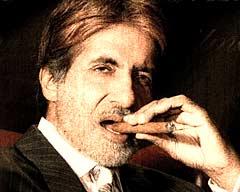"We will seek justice in the honourable High Court of Bombay" said Dr Shekhar Salkar, General Secretary of National Organization for Tobacco Eradication (NOTE). "Mr.Amitabh Bachchan was clearly shown smoking a cigar [in 'Family' film] in all the display-hoardings prominently. This amounts to clear and unambiguous breach of the law prevalent within the state and the country. However the session court did not appreciate the view of NOTE India, thereby absolving the respondents of the charges" added Dr Salkar.
In March 2008, the Sessions Judge, North Goa, Mr U V Bakre had quashed the legal proceeding against Amitabh Bachchan, chairman of Amitabh Bachchan Corporation Limited (ABCL), for smoking cigar on-screen in 'Family' film. The sessions' Court had also quashed the process issued against Mr Keshu Ramsay and M/s DMS Film Pvt Ltd.
These hoardings, showing Amitabh smoking a cigar, were in gross violation of The Cigarettes and other Tobacco Products (Prohibition of Advertisement and Regulations of the Trade and Commerce, Production Supply and Distribution) Act, 2003 and under Section 7 of the Goa Prohibition of Smoking and Spitting Act, 1997.
The Cigarette and other tobacco products Act (2003) and other notifications have advocated for ban on portrayal of tobacco use in films, since it was identified by many studies done in India and abroad, that it influences children and young people to begin tobacco use. India's Health and Family welfare minister Dr Anbumani Ramadoss had said during World Conference on Tobacco or Health (2006) while accepting the Luther Terry Award for tobacco control that:
"Studies have established that portrayal of tobacco use in films is one of the biggest influencer for young people to begin tobacco use. Since The Cigarette and other Tobacco Products Act (2003) came into increasing effect, not only tobacco use in films have been on the rise, but also tobacco brand placement."
However after about two years now, the words of Dr Ramadoss are yet to see the light of the day.
In January 2006 when Amitabh Bachchan smoked a cigar in 'Family' film and such posters were splashed all over India, NOTE (Goa) and Indian Society Against Smoking (ISAS, Lucknow) had issued legal notices to Amitabh Bachchan. NOTE went ahead with legal proceedings against the violation of the India's tobacco control Act.
"Exposure to tobacco use in movies is clearly linked to youth tobacco use. Simply put, more must be done to ensure that tobacco use in movies is removed from films seen by our nation's youth" said WHO awardee (2005) Professor Rama Kant, who is the founder-President of ISAS. "We have within our powers one simple and effective way to jump start the decline in youth tobacco use - delete tobacco use in films from the list of influences that rob our youth of longer and healthier lives by removing tobacco use from movies, unless they clearly depict the negative health effects" added Prof Kant.
"We anticipate that this [High Court judgement] would be a landmark case meriting a landmark judgement. It would either strengthen the case of anti-tobacco lobby vis-a-vis clandestine and surrogate advertisement of unhealthy products or it would prevail upon our lawmakers to resort to more stringent laws without exploitable loopholes" said Dr Salkar.
Tobacco is the leading preventable cause of death in the world. It causes 1 in 10 deaths among adults worldwide. In 2005, tobacco caused 5.4 million deaths, or an average of one death every 6 seconds. At the current rate, the death toll is projected to reach more than 8 million annually by 2030 and a total of up to one billion deaths in the 21st century.
In March 2008, the Sessions Judge, North Goa, Mr U V Bakre had quashed the legal proceeding against Amitabh Bachchan, chairman of Amitabh Bachchan Corporation Limited (ABCL), for smoking cigar on-screen in 'Family' film. The sessions' Court had also quashed the process issued against Mr Keshu Ramsay and M/s DMS Film Pvt Ltd.
These hoardings, showing Amitabh smoking a cigar, were in gross violation of The Cigarettes and other Tobacco Products (Prohibition of Advertisement and Regulations of the Trade and Commerce, Production Supply and Distribution) Act, 2003 and under Section 7 of the Goa Prohibition of Smoking and Spitting Act, 1997.
The Cigarette and other tobacco products Act (2003) and other notifications have advocated for ban on portrayal of tobacco use in films, since it was identified by many studies done in India and abroad, that it influences children and young people to begin tobacco use. India's Health and Family welfare minister Dr Anbumani Ramadoss had said during World Conference on Tobacco or Health (2006) while accepting the Luther Terry Award for tobacco control that:
"Studies have established that portrayal of tobacco use in films is one of the biggest influencer for young people to begin tobacco use. Since The Cigarette and other Tobacco Products Act (2003) came into increasing effect, not only tobacco use in films have been on the rise, but also tobacco brand placement."
However after about two years now, the words of Dr Ramadoss are yet to see the light of the day.
In January 2006 when Amitabh Bachchan smoked a cigar in 'Family' film and such posters were splashed all over India, NOTE (Goa) and Indian Society Against Smoking (ISAS, Lucknow) had issued legal notices to Amitabh Bachchan. NOTE went ahead with legal proceedings against the violation of the India's tobacco control Act.
"Exposure to tobacco use in movies is clearly linked to youth tobacco use. Simply put, more must be done to ensure that tobacco use in movies is removed from films seen by our nation's youth" said WHO awardee (2005) Professor Rama Kant, who is the founder-President of ISAS. "We have within our powers one simple and effective way to jump start the decline in youth tobacco use - delete tobacco use in films from the list of influences that rob our youth of longer and healthier lives by removing tobacco use from movies, unless they clearly depict the negative health effects" added Prof Kant.
"We anticipate that this [High Court judgement] would be a landmark case meriting a landmark judgement. It would either strengthen the case of anti-tobacco lobby vis-a-vis clandestine and surrogate advertisement of unhealthy products or it would prevail upon our lawmakers to resort to more stringent laws without exploitable loopholes" said Dr Salkar.
Tobacco is the leading preventable cause of death in the world. It causes 1 in 10 deaths among adults worldwide. In 2005, tobacco caused 5.4 million deaths, or an average of one death every 6 seconds. At the current rate, the death toll is projected to reach more than 8 million annually by 2030 and a total of up to one billion deaths in the 21st century.
- Add new comment
- 24882 reads










Comments
Pages
Add new comment